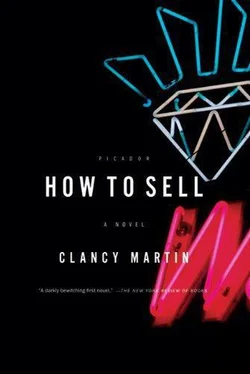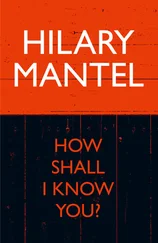“You see her!”
I looked for the minute inclusion again through the crown and the table but it was gone.
“I named the diamond the pink ballerina. For that inclusion. If you see her thoroughly, looking many times, you will see she has a figure like a dancer.”
“What does it look like under a microscope? Under thirty power?”
“The microscope? Don’t be ridiculous. In the microscope it is gone. Ten power is the correct magnification for inspecting the brilliant cut. That is the reason we use the ten power. Not because they did not have microscopes in the nineteenth century or some other GIA nonsense. Anyone can make a stronger lens if he can make a lens at all.”
The buzzer rang in the outside office. Kizakov looked at his video monitor. He took the diamond from me and put it back in his pocket.
“Now you learn something else,” he said. “Idan!” he shouted down the back hallway. “Your appointment is here.”
Idan was Elie’s son. He was a dark-haired, dark-skinned man about ten years older than me who had once taken me for a ride around Highland Park and down Lovers’ Lane in his Corvette convertible. “Let’s stop in at Gucci,” he had said, and bought a shirt, a tie, and two pairs of gray socks. “You want anything, Bobby?” he had said. “I’m buying.” I knew better than to take him up on it. Plus I was shy to ask. When he came to the store, all the saleswomen talked about him after he left. “His eyes,” they said. “Have you ever seen such eyes on a man?” It was true that he had unusually large, pale gray eyes, like the color of platinum, in fact. But much prettier. I believed it was his eyelashes they were actually thinking of.
It could not have been easy to be Idan, I thought. His father was part of the generation that founded modern Israel. Kizakov had even known the great Ben-Gurion, and worked under Berl Katznelson in the Labor movement. But I never saw Idan show any resentment toward his father.
Kizakov waited until Idan had pushed the button to open the electronic door for the two men waiting outside. They came into the large Plexiglas mantrap in the outer office and then waited while Idan buzzed them into the main office. We watched them on the monitor. They were young men and one carried a briefcase. The other one wore a baseball cap. They did not look like the sort of men I associated with Kizakov’s office. If I had seen them in this building at all I would have expected to see them in the gold and colored-stone showrooms of the newer Pakistani and Chinese wholesalers on the second and third floors. Kizakov watched his son greet them and shake their hands. Then he took me by the arm and we walked up front.
“This is my father, Elie Kizakov,” Idan said. Kizakov nodded to them both but he did not offer his hand. One of them held out his hand for a moment and then dropped it. But he did not seem dismayed.
“Danny Johnson says you guys are the man,” the fellow with the briefcase said. I could not see his feet but I thought, I bet he is wearing tennis shoes. He had yellow teeth. He kept pulling his lips back. His yellow teeth looked frightening against his white skin.
“Who is this?” the one in the baseball cap said, and shook his thumb at me.
“Daniel Johnson is a very good customer of ours,” Kizakov said, ignoring the question. “Idan tells me you have a diamond to sell.”
“Damn right we got a diamond to sell,” the man in the baseball cap said. His partner gave him a look. “I mean, yes sir. Danny says you are the man for it. I mean, he says you guys can pay. Cash. We ain’t interested in no check.”
“Why don’t we have a look at your diamond?” Kizakov said. “Idan?”
Idan unfolded a diamond cloth on the showcase and placed a set of tweezers and a brass hexagonal loupe beside it. He carefully turned the small, portable diamond scale on the showcase to face the two men. He quickly recalibrated the scale. The one man put the briefcase on the showcase and opened it. He took a bulging, oddly cardboardy diamond paper from the briefcase and opened it on the showcase. He turned the paper and spilled the diamond out onto the diamond cloth. It was an oval. It looked like five or six carats to me.
Elie Kizakov pulled his lips between his teeth and opened his eyes in that way he had. It was an impatient expression.
“What does it weigh?” Idan said.
“Six carats,” the man in the baseball cap said. “Six on the money.”
Idan cleaned it with the white cloth and then placed it in the diamond scale. “Five sixty-two,” he said. He looked at his father.
“Why did you ask me what it weighed if you was just going to weigh it? Don’t you take our word? Don’t a man’s word count for something with you? I don’t like that. In America we take a man’s word as his promise. I think you ought to take a man’s word for something,” the one in the baseball cap said.
Idan started to reply. His father raised his hand to silence him. The diamond lay there on the scale and watched us. The man in the baseball cap rubbed his hands on his sides, on the hips of his jeans. A second or two ticked by. Then, without any flinch or change of demeanor that might have warned us, the other man, the one not in a baseball cap, shouted, “I am sick of this shit! Up with your hands, Jew-boy!” and pulled a black handgun from the briefcase. We could not see into the briefcase because he had kept the lid turned toward us. To hide the handgun, I realized. He waved the handgun in the air oddly and loosely, like a flyswatter, and then pointed it at Idan. Idan reached for something — I never learned what he was going for — and the man with the weapon grabbed him by the side of the head and slammed his face down onto the showcase. It was glass but it did not break. Baseball Cap shouted, “The cash! Where’s the safe, old man? He’ll kill him! He’ll blow his brains out!” I saw that the other man had pulled Idan over the showcase and onto the floor and, kneeling with one knee on top of him, like a hunter kneels on a deer he has killed, had the barrel of the gun pressed into the socket of his eye. Idan was silent and lying there, still.
Then a totally unexpected thing happened. Kizakov, who was seventy years old and perhaps five feet tall, five feet tall in his boots, and who had a white beard halfway down his chest, vaulted the showcase we were standing behind, grabbed the gun from the man who was holding it in his son’s eye, and pistol-whipped him to the floor. He continued pistol-whipping him as his buddy Baseball Cap looked on in astonishment. For a moment Baseball Cap looked at me and in our eyes we briefly shared a kind of recognition that, had the circumstances been different, might have made us friends, or at least would have started us laughing. Then he turned away and ran for the door.
“Stop!” Elie Kizakov commanded.
But he didn’t stop. He made it into the mantrap and that stopped him.
His partner was unconscious or dead. His face, his neck, and his T-shirt were covered in blood. Kizakov was bloody also and had blood on his glasses. I looked for blood on Idan but did not see any. There was a surprising amount of blood all around, however. Later I saw it in odd places, like the magazines on the table next to the sofa on the back wall and in the candy dish on the coffee table.
Kizakov stood up. He put the gun on the showcase. He cleaned his glasses with a handkerchief from his pocket.
“I’ll call the cops,” Idan said.
“Do not be a fool,” his father said. Baseball Cap struggled and shouted in the mantrap. He was very frightened. He looked like a sparrow trapped in a room full of closed windows.
Kizakov picked up the diamond, squinted at it quickly and closely with it held between his forefinger and thumb, and then placed it in his pants pocket.
Читать дальше











